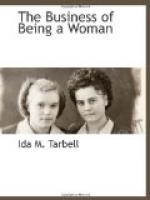One of a woman’s real difficulties in creating a free-speaking household is her natural tendency to regard opinions as personal. To differ is something she finds it difficult to tolerate. To her mind it is to be unfriendly. This propensity to give a personal turn to things is an expression of that intensity of nature which makes her, as Mr. Kipling has truthfully put it, “more deadly than the male!” She must be that—were she not, the race would dwindle. He would never sacrifice himself as she does for the preservation of the young! This necessity of concentrating her whole being on a little group makes her personal. The wise woman is she who recognizes that like all great forces this, too, has its weakness. Because a woman must be “more deadly than the male” in watching her offspring is no reason she should be so in guarding an opinion. Certainly if she is so, conversation is cut off at the root.
Not infrequently she is loath to encourage free expression because it seems to her to disturb the peace. Certainly it does disturb fixity of views. It does prevent things becoming settled in the way that the woman, as a rule, loves to have them, but this disturbance prevents the rigid intellectual and spiritual atmosphere which often drives the young from home. Peace which comes from submission and restraint is a poor thing. In the long run it turns to revolt. The woman, if she examines her own soul, knows the effect upon it of habitual submission to a husband’s opinion. She knows it is a habit fatal to her own development. While at the beginning she may have been willing enough to sacrifice her ideas, later she makes the painful discovery that this hostage to love, as she considered it, has only made her less interesting, less important, both to herself and to him. It has made it the more difficult, also, to work out that socialization of her home which, as her children grow older, she realizes, if she thinks, is one of her most imperative duties.
A woman is very prone to look on marriage as a merger of personalities, but there can be no great union where an individuality permits itself to be ruined. The notion that a woman’s happiness depends on the man—that he must “make her happy”—is a basic untruth. Life is an individual problem, and consequently happiness must be. Others may hamper it, but in the final summing up it is you, not another, who gives or takes it—no two people can work out a high relation if the precious inner self of either is sacrificed.
Emerson has said the great word:—
Leave all for love; Yet, hear me, yet, Keep thee to-day, To-morrow, forever, Free as an Arab! Of thy beloved.
The “open house,” that is, the socialized house, depends upon this free mind to a degree only second to that spirit of “good will to man,” upon which it certainly must, like all institutions in a democratic Christian nation, be based. This




